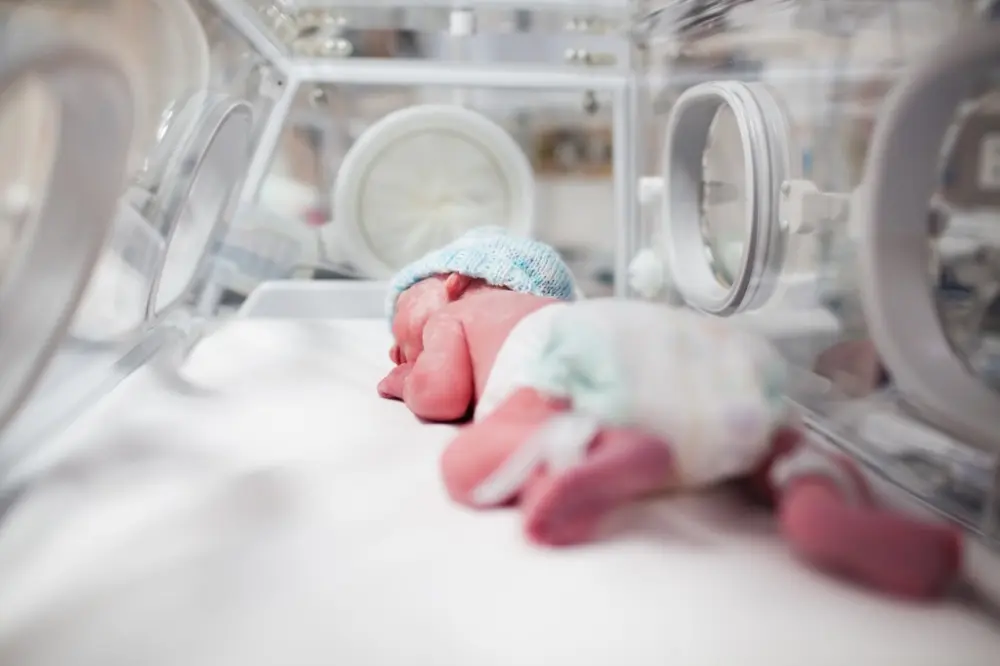Premature delivery is also associated with low birth weight (less than 2500 grams) or restricted intrauterine development (1)
Infants born preterm are at greater risk than infants born at term for mortality and a variety of health and developmental problems (2).
Early delivery can happen due to many external and internal factors such as smoking, high blood pressure, etc.
So today’s article is about premature birth, what reasons behind this, precautions, signs, and more things that you need to know.
What considers premature birth? and how common is it?
Contents
Premature birth that happens at 37 completed weeks of gestation is known as premature delivery.
A normal pregnancy lasts for 40 weeks, a birth is considered premature when it occurs before the 37th week of pregnancy.
Babies born prematurely are known as preemies or premies.
The final week between the 34th and 37th weeks in the womb is vital for healthy weight gain and the full development of several organ systems including:
- liver
- brain
- lungs
NOTE: The lungs are one of the last organs to mature in the womb this is why premature babies spend the first days or weeks lives in ventilators.
How common is premature birth? Every year about 15 million babies are born early, which is the most common death among infants worldwide.
The chances of survival at 22 weeks born baby are about 6%, while 23 is 26%, at 24 is 55% and at 25 weeks is about 72%.

Causes
There are certain causes in the pregnancy which can lead to premature or early birth.
- The common cause of the pre-term birth is the initiation of the labor with or without the rupture of the membrane.
- heart disease
- Polyhydramnios (a condition that leads to excessive accumulation of the amniotic fluid in the amniotic sac)
- diabetes
- Cervical incompetence
- High blood pressure
- kidney disease
Another factor that is also significantly associated with premature birth includes:
- Previous premature birth
- smoking, and too much alcohol
- lack of nutrition before and during pregnancy
- certain infections such as lower genital tract
- being overweight and underweight
- Physical injury or trauma
- certain maternal issues like repeated urinary tract infection
- obstetricians
- a weak cervical opening early
- IUGR severe intrauterine growth restriction (fetus is smaller than expected during pregnancy) also leads to preterm labor.
- Stressful life events, such as the death of a loved one or domestic violence
- Multiple miscarriages or abortions
Check Out – Best Sleeping Position During Pregnancy
Signs
One of the most common indications is multiple pregnancies include:
- When a mother is having a triplet or twin or quadruplet pregnancy
- more than 4 uterine contractions in one hour
- vaginal bleeding in the 3rd trimester
- heavy pressure in the pelvis
- stomach pain like period pain
- a watery discharge from the vagina (that indicates a premature rupture of the membrane that surrounds the baby)
If you see any symptoms or any other discomfort during pregnancy then you should consult your doctor.
A premature birth baby shows these signs include:
- low body weight
- low body fat
- small size
- Low body temperature, especially immediately after birth in the delivery room, due to a lack of stored body fat
- trouble in breathing
- Fine hair covering much of the body
- yellow skin
Complications with premature babies
There are certain short-term complications of preterm birth according to the doctor’s circle.
- Difficulty in breathing
- necrotizing enterocolitis (where the baby is predisposed to infection because of the gut immaturity)
- low immunity, immunity is not fully developed in a full-term infant.
- cerebral palsy is one of the bad complications of preterm birth. Dr. Himani Sharma says
- difficulties with feeding, sucking, and swallowing
- Risk of blood problems such as anemia and newborn jaundice
- Immature gastrointestinal systems (NGS)
Short-term complications can be handled very well in a hospital care setup with the proper NICU.
But long-term complications are apparent only after the baby is discharged.
- learning or social disability
- inability to maintain body temperature
- cerebral palsy (a disorder that affects a person’s ability to move and maintain balance and posture) involved the brain.
- hearing loss, because of improper development of the hearing system of the baby’s
- vision problem, because of the retinopathies of the premature
- More prone to infections like asthma or because of decreased immunity
Precautions
Early birth, babies require quick help with warmth and breathing, this would determine the life and death situation for the baby.
It is very important to immediate care for premature babies. Dr. Piyush Shah (India) says.
Precaution by doctor
When the baby comes out, the doctor immediately put it in plastic wraps so the baby’s body temperature is maintained.
For breathing, difficulty doctors use CPAP (continuous positive airway pressure) that helps to maintain the breathing in a baby.
Jaundice is a condition where there is a yellowish discoloration of the skin and the eyes and these can be treated with phototherapy.
Feeding
Premature babies who receive only breast milk have a much lower risk of developing NGS (3).
Mother milk is the best nutrition for a premature baby, but the problem baby doesn’t have this much capacity to suck, or swallow milk.
- If the baby is less premature like less than 33 weeks, then a tube requires to feed the baby.
- If the baby is mature enough like 34 to 36 weeks and higher, we can directly start breastfeeding, bottle feed, and spoon feed also.
Some early birth babies require more proteins and some other nutrients. So health care adds some extra nutrition to full fill baby’s needs.
There is no side effect of giving mother’s milk and it is freely available, at the perfect temp, and at the right time and it is always a requirement of the baby.
NOTE: So for a premature baby, the number one choice is always the mother’s own milk.
How long does the premature baby have to be in the NICU?
But what is NICU? (newborn intensive care unit) a health care provider in a hospital that checks every minute of the baby.
It depends on how premature the baby is, which decided how long you are going to stay in the hospital. Dr. Manigandan Chandrasekaran says.
- Expert advice that if a baby is born at 26 weeks before normal birth, it stays in the NICU for at least 6 to 8 weeks.
- At the same time, the baby is born at 32 to 33 weeks, maybe a week or two might stay in the NICU.
Baby stays also depend on baby problems like infection, gut issues, and breathing problems.
NOTE: Close to the term gestation like 37 to 38 weeks, babies need to stay in the hospital for their care, and then they can go home.
Ways to prevent premature birth?
Some other external reasons which you can keep out of your life to avoid premature birth include:
- Reduce high blood pressure, by avoiding triggering things
- control diabetes
- urinary tract infections should be prevented
If delivery is going to happen before that only we put the patient on certain tocolytic medicine like retro tin or nifedipine.
If the delivery is really eventful, so doctor gives a beta methasone injection of 12 mg 24 hours apart or Hexa methasone 6 mg 4 hours apart, 4 doses.
So that once the baby is born there will be decreased chances of infant respiratory distress syndrome. Dr. Hema Divakar says.
Cervical Cerclage is another way to prevent pre-term delivery.
If your cervix has weakened, your healthcare provider will likely recommend a cervical cerclage
It doesn’t allow the baby to come out at an early time, It will be cut in the 9th month as you go through the labor pain.
BOTTOM LINE
Premature birth increases the risk of mortality and a variety of health-related problems in long term.
Early birth can happen due to many external and internal factors such as smoking, high blood pressure, stress full events, etc.
Premature babies need a sufficient amount of nutrition to the number one choice is always the mother’s breast milk.




